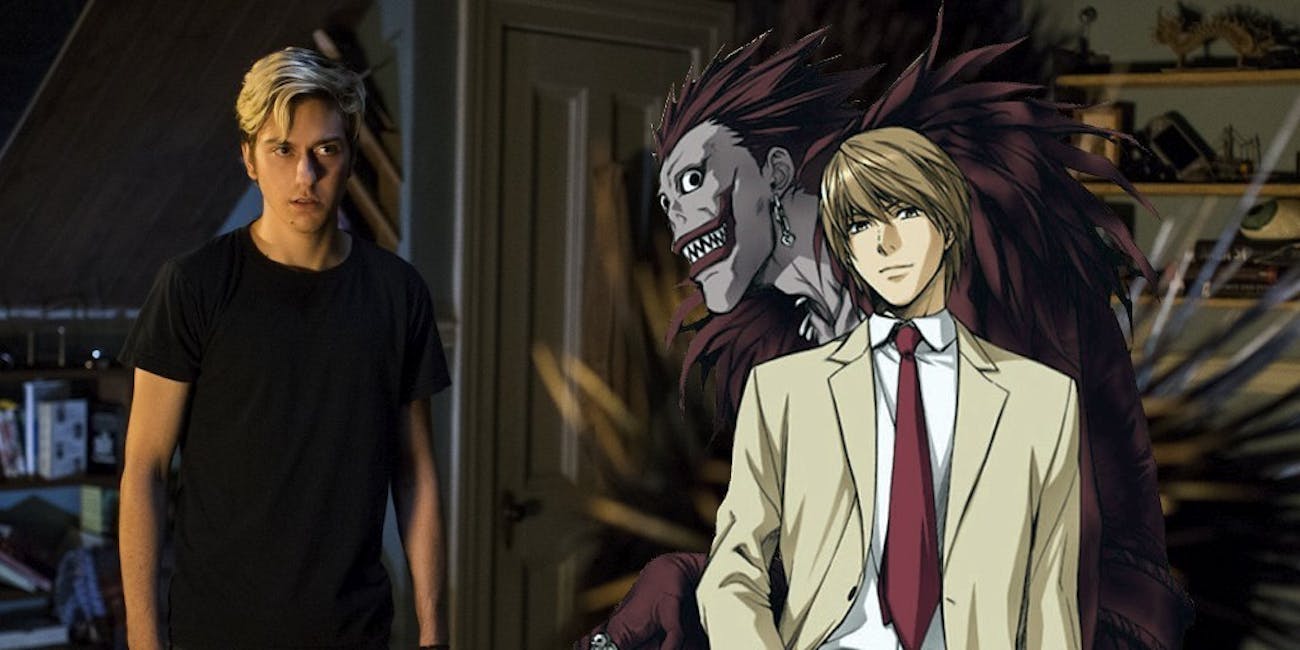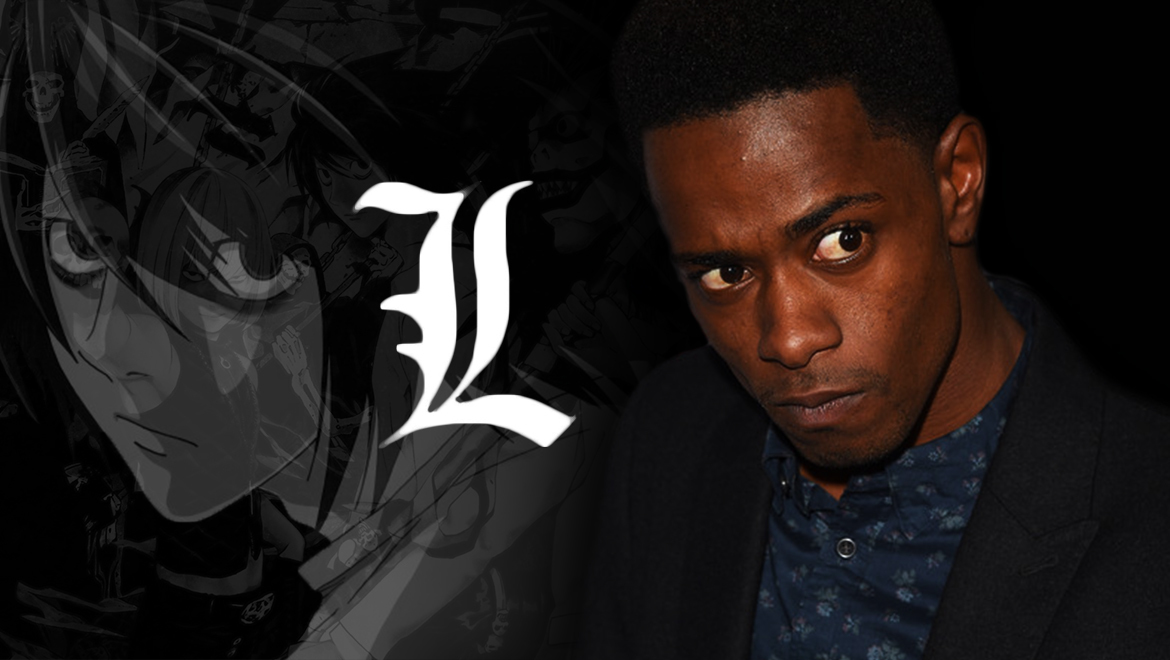Alita: Battle Angel has broken the curse that Hollywood
can’t make good movies out of Japanese manga and anime, mostly thanks to James
Cameron and Robert Rodriguez commitment to the film. While this could open the
door for future visionaries to bring popular anime to the big screen, it
doesn’t make up for the many disappointing movies that preceded it. We all know
how much Dragonball Evolution sucked,
how Ghost in the Shell duplicated the
look of its source material but was disappointingly hollow, and well, then
there is Netflix’s take on Death Note.
Death Note is based on the hugely popular
manga by Tsugumi Ohba and Takeshi Obata, a thrilling, suspenseful detective horror
story. The manga, subsequent anime, and other live action movies, worked well
for their discussion on morality, the exciting cat-and-mouse game between the
designated hero and villain, and the supernatural world building. Netflix’s
film, directed by Adam Wingard, tried to adapt the story, world, and
characters, but didn’t quite have the depth. Feeling like it was in a bit of a
rush, Death Note eventually grinds to
a discombobulated halt as it fumbles up the source material, chucking out the
meat of the story, to rely on familiar tropes, an awkward romance, and
characters making dumb decisions.
The
manga/anime is about Light Yagami, a Japanese high school student who comes
across the titular Death Note, a book which will kill whoever’s name is written
within it. Light is approached by the book’s owner, Ryuk, a leering, grinning
Shinigami (or death god), and pursues a goal to rid the world of criminals via
the Death Note’s powers. Light soon develops a god complex, declaring himself
the new embodiment of justice in the world, earning the messiah name of “Kira”.
He finds opposition from “L”, a strange but genius detective, and a group of
police led by Light’s own dad, who want to arrest the anonymous Kira. Light and
L try to unearth each other’s identities in an incredible game of wits.
The Netflix
adaptation takes that basic premise and runs with it. Light, now an American
student from Seattle, and played by Nat Wolff, acquires the Death Note, and
undergoes the same journey as his Japanese counterpart. Ryuk is voiced and
partially mo-capped by Willem Dafoe, and is by far the most enjoyable part of
the movie. Light adopts the mantle of Kira, becoming a champion of the people
by killing outlaws. He teams up with the unstable cheerleader Mia Sutton
(Margaret Qualley), to spread their own brand of justice, and form a
destructive romantic relationship. Light’s dad James Turner (Shea Whigham) is
recruited by this film’s version of L (Lakeith Stanfield) to help stop Kira.
Nat Wolff’s
portrayal of Light is a very mixed bag. In the manga, Light Yagami is this
near-sociopathic, manipulative genius who knows how to play a deadly game of
chess, has a strong sense of self-justification, and shows little concern for
others, even his own loved ones, especially if they stand between him and his
self-granted godhood. Wolff’s Light is a weedy, wimpy, garden variety high
school loner, but has a sense of conscience. Whilst Light Yagami would kill
anyone who could expose his identity, regardless of right and wrong, Light
Turner is driven a little more by morals. He only wishes to punish criminals,
and protect the innocent. This comes from a minor sense of victimisation he
has, receiving detention for doing homework for others, when he is being
bullied into doing it to begin with. This sets up Light’s belief that the
justice system is flawed through personal experience. This is further extended
when it turns out his mother was murdered, and the killer got away.
Light lacks
a sense of initiative and self-preservation, performing increasingly stupid
decisions as the movie goes on, and even completely breaks down at the end of
the film to have a shouting match with Mia. Because he shares his name with
such an iconic character, Light has very little in common with Light Yagami,
and is a poor attempt to adapt the anti-hero to the big screen. I don’t want to
see Light Yagami freaking out at mistakes he made, or arguing with another
character. He should be calmly and carefully plotting how their destruction.
While I
enjoyed Lakeith Stanfield’s performance of L, the characterization is perhaps
even worse than Light’s. He captured L’s eccentric personality well, but the
character is defined as being a lot more emotionally vulnerable, panicky, and
not very good at sleuthing. He accuses Light of being Kira with any physical
evidence or legit suspicions, then goes completely ballistic, grabs a gun, and
starts chasing Light through the streets, whilst performing parkour moves and
sliding over cars. It feels completely out of place for such a character
defined by his mind
Light and L
feel like stand-ins for the actual characters, as neither have much in common
with their anime counterparts. Perhaps if these two had been set up as original
characters then adaptations of two established ones, the transition wouldn’t
have been so difficult. I understand that they wanted to add a more vulnerable,
morally grey element to both characters, which is fine, but they are so far
flung from the source material, they might as well have been new characters altogether.
The
cat-and-mouse duel of wits is barely acknowledged in the film, with L somehow
figuring out, or rather guessing, that Light is Kira, with no evidence.
Meanwhile, Light’s father puts two-and-two together with crucial evidence and
motive, whilst the supposed genius detective L points fingers, and then gets
all whiny when things go wrong. Instead, most of the film is dedicated to Light
and Mia’s romance, and their increasingly desperate attempts to cover up their
tracks. I suppose this is what is meant to set Death Note apart from the other adaptations, focusing on immature
and frankly stupid teenagers wielding a power they abuse.
The
character make increasingly stupid decisions, whittling down to a screaming
match between Light and Mia atop a ferris wheel, whilst the scheming Ryuk is
trying to demolish. Light is set up as a character who is willing to do
whatever it takes to bring about justice, despite his initial hint of being a
bit more of a moral person. But, by the end, he appears to have completely
detached himself from his godhood, whimpering and pleading with Mia to throw
away the Death Note so that they can be together. But, then, it turns out
through rather forced means that the whole third act was set up by Light so he
could kill Mia and get back the Death Note.
The lore of
the Death Note itself gets ignored repeatedly in the movie. If a person’s name
is written down in the book, they will die, and such a fate cannot be averted.
But, the film changes that, including a rule that a person’s death can be
stopped if the page with their name on it is burnt. Also, I am not sure if
Light has a sadistic streak, but he decides to come up with rather nasty, Final
Destination-style deaths for all of his victims, some of which feel impossible
to pull off (going against Ryuk’s rule that deaths can only occur if physically
possible).
Light’s
girlfriend Mia is based on the character Misa Amane, a pop idol who owns a
second Death Note in the manga. She has a darker side, but hides it behind a
bubbly, airheaded persona that may or may not be real. To Light Yagami, Misa is
just another pawn to use, and he has no genuine affection for her. Mia Turner
has no real motivations. Why is she a cheerleader? She doesn’t exactly fit the
bill for being one. She is grouchy, cynical, nihilistic, slightly gothic, and
we are first introduced to her performing a human pyramid whilst smoking. She
looks more like a girl you’d find smoking behind the school dumpsters, then
being star of the cheerleading squad.
Her
reasoning for joining Kira is, well, without reason. She is mildly angry at
society for some reason with no further exploration, and that’s it. We know
nothing about her as a person, or why she wants to use the Death Note apart
from being a bit of a ruthless, slightly unhinged teenager with a bad attitude.
The romance between Light and Mia dominates the movie, but beyond their
“devil-may-care” attitude to what they are doing. In one scene, Light and Mia
examine a website dedicated to Kira, where people list those they think should
die. Whilst Mia is just eager to bring out the guillotine, Light is more
logical, believing most of the listed criminals might just be people who his
followers dislike or spite. Mia looks at him as if he just decided to spare Ted
Bundy. What is her motivation in life?
Said scene is certainly a new take on Death
Note, and might’ve helped it become a more interesting thought piece if it
wasn’t such a mess.
If there
was a shining light in this murky mess of a movie, it is Willem Dafoe as Ryuk.
Though the grinning phantom mostly lingers in the shadows, Dafoe really brings
the character to life, bringing back that devious, predator essence he had when
he played the Green Goblin. While Ryuk is more of a watcher in the manga,
entertained by Light and L’s game, he takes on a more active role in the
Netflix movie.
Another
problem with the film is changing the setting from Japan to America. Light and
Mia go out of their way to utilise the Kira name without much food for thought,
believing such a name would throw off the cops. Light claims “Kira” is both
Russian and Celtic for “light”. I looked both translations up, they don’t.
Plus, why would you use a word that supposedly translates in multiple languages
to the same meaning? They dance around the fact whether or not Ryuk is a
Shinigami or not, or some sort of demon who murders people for fun – only for
Light to later be seen reading a book showing Ryuk depicted in his anime design
in a piece of Japanese artwork.
Sadly, Death Note is a mismatched movie that
doesn’t really know what it wants to be. Ironically, the titular Death Note,
the primary game of wits, and the police investigation are forgotten about in
the film, as it favours choppy romance and even cheesier action set pieces
instead of exciting psychological thrills. They even had the nerve to end on a
cliffhanger and setting up a potential sequel. Netflix could have easily
adapted Death Note into a TV series
or a miniseries, rather than a ninety-minute plot that has little in common
with the popular manga. Perhaps, it could’ve been done a little differently.


/cdn.vox-cdn.com/uploads/chorus_image/image/56348235/DN_Unit_02518_R_CROP.0.jpg)

No comments:
Post a Comment